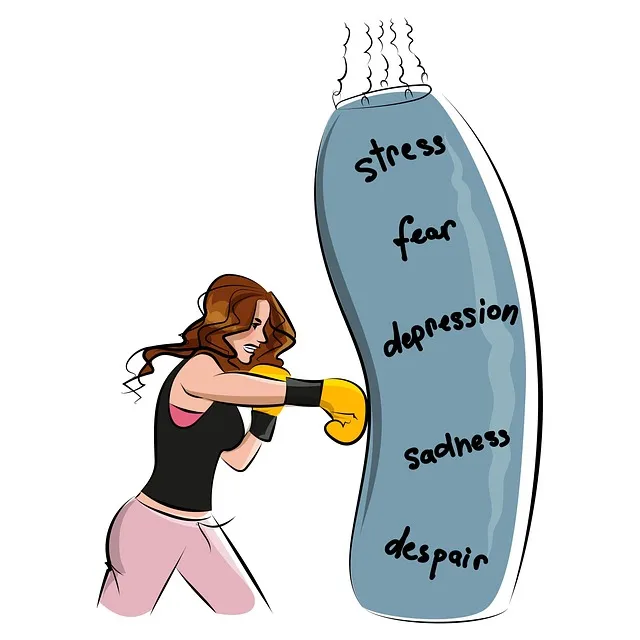Kaiser Permanente's Mental Health Access Center in Centennial addresses community challenges by offering tailored care, stigma reduction programs, and holistic initiatives like Mood Management workshops and peer support groups. This center enhances mental healthcare accessibility, raises awareness through diverse programs, and fosters open dialogue for better coping strategies and improved quality of life, with success measured through qualitative feedback and engagement depth.
Community outreach programs play a pivotal role in addressing mental health disparities, especially in urban areas. This article explores the implementation of such initiatives, using Kaiser Permanente’s model as a case study with its successful Mental Health Access Center in Centennial. We delve into understanding community needs, designing inclusive programs, and measuring their impact through engagement strategies. By examining this approach, we aim to inspire similar initiatives, fostering better access to mental health services for all.
- Understanding Community Needs for Mental Health Services
- Designing Programs: Kaiser Permanente's Approach
- Implementing the Access Center in Centennial
- Measuring Success and Community Engagement Strategies
Understanding Community Needs for Mental Health Services

In many communities, access to mental health services remains a significant challenge, with barriers such as limited resources, stigma, and lack of awareness hindering individuals from seeking help. Organizations like Kaiser Permanente’s Mental Health Access Centers in Centennial play a vital role in addressing these issues by providing comprehensive care tailored to the unique needs of each community. By understanding local concerns and cultural contexts, these centers offer a range of services that promote mental wellness and coping skills development.
Centennial’s Kaiser Permanente center, for instance, has initiated programs aimed at Mental Illness Stigma Reduction Efforts, recognizing that breaking down societal barriers is crucial for fostering open conversations about mental health. Through educational workshops, community outreach, and peer support groups, the center works to empower residents with knowledge and resources, ensuring they can navigate their journey towards improved mental health and well-being effectively.
Designing Programs: Kaiser Permanente's Approach

When designing community outreach programs, particularly for mental health initiatives like those offered at Kaiser Permanente’s Mental Health Access Centers in Centennial, a structured and compassionate approach is key. Kaiser Permanente takes a holistic view, recognizing that addressing mental well-being involves more than just providing services; it’s about fostering connections and empowering individuals within their communities.
Their programs are meticulously crafted to include a mix of evidence-based practices such as Mood Management workshops and Compassion Cultivation Training. By incorporating these strategies, the organization facilitates Emotional Healing Processes, aiming to create lasting positive changes in participants’ lives. This tailored approach ensures that the outreach resonates with diverse community needs, fostering an environment where individuals can thrive and reach their full potential.
Implementing the Access Center in Centennial

In Centennial, the establishment of the Kaiser Permanente mental health access center has been a game-changer for the community’s well-being. This initiative aimed to enhance accessibility to mental healthcare services and promote overall mental health awareness. The access center offers a welcoming space where residents can connect with professionals who provide personalized support. Through regular Stress Management Workshops Organization, self-awareness exercises, and Coping Skills Development sessions, the center caters to various age groups and backgrounds.
Community members are actively engaged in these programs, fostering an environment of open dialogue and mutual support. The Kaiser Permanente mental health access center has successfully revolutionized how Centennial residents address their mental health concerns, ensuring better coping strategies and improved quality of life.
Measuring Success and Community Engagement Strategies

Measuring the success of community outreach programs is a multifaceted endeavor, especially when focusing on mental health initiatives like those offered by Kaiser Permanente’s Centennial Mental Health Access Center. Key performance indicators (KPIs) should include not just the number of individuals served but also the depth of engagement and perceived benefits. This can be gauged through qualitative feedback from participants, such as improvements in stress management, emotional healing processes, and positive thinking.
Community engagement strategies play a crucial role in program success. Centering these efforts around the needs and preferences of the community ensures that outreach is relevant and impactful. Techniques like workshops, support groups, and one-on-one counseling sessions can foster deeper connections, encouraging open dialogue about mental health challenges and solutions. By employing these approaches, Kaiser Permanente’s Centennial Access Center aims to create a supportive environment where individuals feel empowered to take charge of their well-being.
Community outreach programs, such as the Kaiser Permanente mental health access center in Centennial, are transforming access to care. By understanding local needs, designing targeted initiatives, and measuring success through community engagement, organizations like Kaiser Permanente are making mental healthcare more accessible and inclusive. The implementation of these programs plays a crucial role in fostering better mental well-being within communities, ensuring that support is readily available when it matters most.






